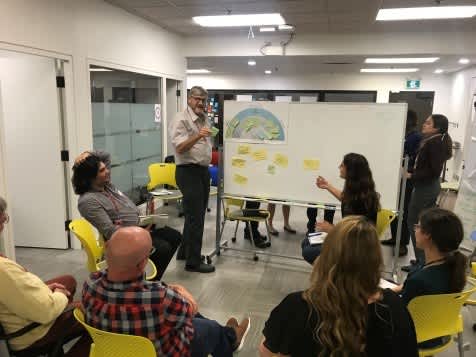On 21 September, Global Affairs Canada’s South Sudan development division hosted an interactive, full-day pilot “Co-Lab” with nine CSOs from the CCIC’s Africa-Canada Forum. GAC staff from across Sub-Saharan Africa, International Security and Political Affairs, and Global Issues and Development branches and CSO representatives exchanged experiences on Canada’s collective response to the challenges in South Sudan from both a government and civil society perspective.
Looking to ground the day with personal experiences, participants first shared photos that describe resilience in South Sudan. Participants reminded each other that success may look different in a fragile state and that despite the hardships, South Sudanese continue to demonstrate strong resilience.
With the Feminist International Assistance Policy as an overarching theme and an integrated approach to Canada’s engagement in mind, participants discussed the intersectionality of gender equality, including the role of ethnicity, income, and education and how to address these factors in gender responsive programming. CSOs highlighted that GAC’s new policy has caused them to increase their efforts to understand the cross-cutting sector, which has had positive influence on their programming.
The group also exchanged perspectives of meaningful and inclusive peace building and how to support conflict resolution at local and national levels. CSOs shared their experiences using peace champions across ethnic lines to support the creation of a culture of peace.
In the final session, participants brainstormed programming opportunities to build resilience and assessed the potential impact and feasibility of proposed ideas using interactive tools. This resulted in creative programming ideas to strengthen resilience across all programming areas (e.g. food security, health, etc.), and included ideas such as the use of sport and music in conflict resolution among youth.
Concluding with a participative evaluation, partners expressed gratitude for the collaborative atmosphere and the open and frank discussions that helped both government and civil society organizations better understand the ongoing conflict in South Sudan and the particular challenges of working in a fragile and conflict-affected state.
This was the first time a bilateral development program of GAC has engaged directly with Africa-Canada Forum (ACF) member organizations. Typically, the ACF gathers at the Branch level at the annual GAC-ACF Joint Dialogue (taking place this year in December). The ACF is a working group of the Canadian Council for International Cooperation that brings together more than 40 NGOs, churches, unions and solidarity groups that have an interest in development issues and social justice in Sub-Saharan Africa.
Given the success of the pilot, Africa Branch of GAC will explore hosting Co-Labs with other bilateral programs.
Both GAC and ACF thanks the Collaboration Centre and Fodé Beaudet and Hugo Bastidas from the Centre for Learning in Intercultural Effectiveness and International Assistance Policy for their excellent facilitation.
* This post has been drafted from the report prepared by Diane Tisdall, Development Officer of the South Sudan Development Division—Global Affairs Canada. The Africa-Canada Forum of the CCIC thanks her for her hard work organizing this Co-Lab.


